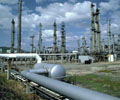

Asia’s light end markets softened in mid-morning trade Aug. 23, and is expected to remain sluggish through the trading week on lingering worries over the impact of the COVID-19 delta variant on crude and oil products’ demand.
Asian gasoline markets are eying the US RBOB-Brent crack, which has hit more than a one-month low, with regional supply bloated by tepid demand.
LPG could see the first drop in Saudi term contract prices, or CPs, for September after increasing for three months amid ample supply and patchy demand, while lower naphtha demand to be used as a petrochemical feedstock for October delivery has pushed spot cargoes to more than eight-month lows.
Front-month ICE October Brent crude futures stood at $66.37/b at 0347 GMT on Aug. 23, up $1.20/b from the previous close.
Gasoline
September FOB Singapore 92 RON gasoline swap inched lower at the start of the trading week Aug. 23, pegged notionally at around $72.10/b, down 1.04% from the previous session, as concerns over the global spread of the delta variant hampered crude.
Industry participants are likely to track this spread, especially in the US, where COVID-19 infections as of Aug. 20 stand near six-month highs, S&P Global Platts reported. Participants will monitor further near-term demand-side weakness, which could lead to more inventory build-ups.
In anticipation of more downside, US RBOB-Brent crack was seen at $19.42/b at 0230 GMT Aug. 23, the lowest since early-July.
Supplies from China, South Korea and Taiwan are expected to increase slightly on the month in late-August and early-September.
A number of LR vessels have been placed on subjects for North Asia-to-Singapore voyages loading end-August.
With Chinese domestic demand limited by lockdowns, refiners could be prompted to export more cargoes to offset inventory pressures, market sources said.
Regional demand continues to lag. Although Indonesia — Southeast Asia’s top gasoline buyer — has gradually eased movement curbs, state-owned Pertamina is expected to keep September gasoline imports thin at around 7 million barrels, industry sources said. In August, Pertamina was heard planning to import 7 million-8 million barrels, Platts reported.
Naphtha
Physical C+F Japan naphtha marker edged up 75 cents/mt from the Aug. 20 Asian close to $607.875/mt in mid-morning trade Aug. 23, boosted by a firmer European market.
Front-month September-October Mean of Platts Japan naphtha swap spread was pegged by brokers at $4.25/mt in mid-morning trade Aug. 23, down 25 cents/mt from the previous session, Platts data showed.
Lower naphtha demand as a petrochemical feedstock for October delivery pushed cash differential for spot cargoes delivered to Japan to more than eight-month lows Aug. 20.
Cash differentials for spot naphtha parcels with minimum 65% paraffin content was assessed at parity to the Aug. 20 Asian close, down $5.50/mt on the week, against benchmark MOPJ naphtha physical on CFR Japan basis, Platts data showed. The cash differential was last at this level on Dec. 10, 2020.
In Asia, naphtha would likely remain in demand as a petrochemical feedstock on costlier LPG -– despite recent falls in propane — and positive olefin margins.
LPG
Front-month September propane contract price swap was notionally indicated at $671/mt on Aug. 23, down from $654/mt on Aug. 20. Weakening Brent futures are putting pressure on Saudi CPs, with September propane swaps indicated $9/mt below term August CPs.
If the level remains through the week when lifters are due to recommend to Saudi Aramco term September CPs, it could be the first drop after three monthly increases.
September-October CP propane swap backwardation was indicated at $2/mt Aug. 23, from $3/mt in the previous session.
Softer CPs come as Asia is receiving healthy LPG supply from the US, though Saudi’s supply in recent acceptances of September-loading cargoes saw up to five Japanese and South Korean lifters getting cuts and delays. But Indian lifters were heard to have received nominated term volumes even as spot demand has reemerged.
Overall supply from the Middle East, led by Qatar and ADNOC, remained ample, with demand largely seen from buyers seeking bargains to resell during winters, traders said.
Source: Platts